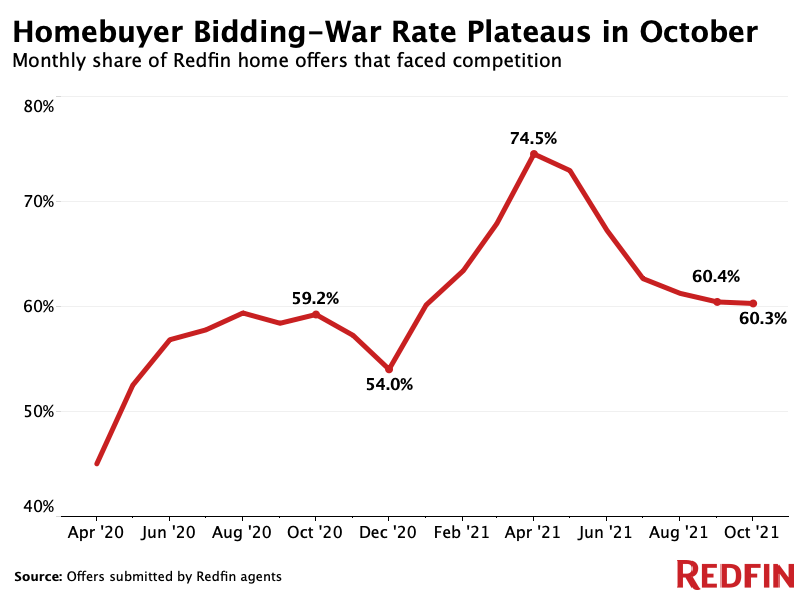Sellers have much to be thankful for this holiday season. According to Diana Olick of CNBC, mortgage applications saw a small jump during a time generally described as low season. Mortgage demand has been rising for three straight weeks according to new Mortgage Bankers Association (MBA) data, with Olick explaining that “Buyers may be rushing in during the usually slow holiday season because they are concerned that mortgage rates will move even higher than they have in the past month. Given how expensive homes are today, some buyers could be priced out if rates move much higher.”

Source: Yardeni Research (Nov. 2021)
Week-over-week, Olick reports that mortgage rates were 10 basis points higher last week than the previous one. Joel Kan, MBA’s associate vice president of Economic and Industry Forecasting, said in a statement:
“Despite the increase in rates, refinance applications rose slightly, driven by a 2% gain in conventional refinances. Borrowers continue to lock in mortgages in anticipation of higher rates in the future. Refinance applications were still more than 30% below a year ago, when the 30-year fixed rate was 32 basis points lower.”
Further, Kan added that “Purchase activity increased for the third straight week, as housing demand remains robust, even as the housing market approaches the typically slower holiday season. Both conventional and government loan applications increased, and the average loan size for a purchase loan was at $407,200, continuing its ongoing 2021 run of being mostly above $400,000.”
Suzette Parmley of International Business Times explains that the uptick in mortgage activity may be a fear factor related to rising interest rates, as they slowly creep up. Indeed, Flávia Furlan Nunes of Housing Wire reported last week that “Mortgage rates strongly increased above 3% in the week ending November 18,” and that the 30-year fixed-rate hit 3.10%, up from 2.98% the previous week. Last year, the same rate sat at only 2.72%.
Competition cooling
Homebuying competition is plateauing, according to a number of sources starting with Redfin. “In October, 60.3% of home offers written by Redfin agents faced competition, little changed from a revised rate of 60.4% in September but down from a pandemic peak of 74.5% in April.”

Source: Redfin (Nov. 2021)
Redfin Chief Economist Daryl Fairweather had this to say about the new data:
“While the housing market slowed in October, the latest homebuying demand data indicates it may be heating back up this month—a sign that bidding wars could start to tick up again…Homebuyers who dropped out of the housing market in the spring have returned under the assumption there will be less competition. They may be surprised to discover that bidding wars are still common because so many house hunters are looking to take advantage of low mortgage rates before they rise.”
The MReport comments on recent Zillow data showing that buying competition is starting to ease in most markets. In October 2021, home value growth decelerated in 42 of 50 of the largest U.S. metros, and median home list prices have been falling since July. Further, “the share of homes that sold above list price shows a monthly decline of 6.6% in September to 47.2%, down from a peak of 51.3% in July.”
The above report continues that due to lack of inventory, many would-be homebuyers have decided to rent instead, driving up rental rates 14.3% since March, the highest increase since monitoring began in 2015. Average rent in the U.S. now stands at 1,873 in October, a $234 year-over-year increase, according to MReport.
A multi-trillion-dollar year?
Thomas Malone of CoreLogic reported last week that 2021 is on track to be the first $2 trillion dollar year in real estate transactions. This is not a result of increased transaction volume, but a significant uptick in home values. Home appreciation and relocation to more expensive markets have created $1.25 trillion in transaction value for Q1 and Q2 2021. Malone explains:
“In the 2000s, around the time of the boom, lower priced areas were overrepresented relative to higher priced areas, reflecting the number in subprime mortgages at the time. Over the last year, sales have moved to higher priced areas. This is most likely reflecting the move to less dense areas, and more spacious homes that can facilitate home office work. The value of the real estate transactions is up not only because of prices, but also because sales have moved to more expensive areas.”
Ben Winck and Madison Hoff of Business Insider discuss this topic, noting that the home price surge is cooling off slowly, however Freddie Mac expects “year-over-year home inflation to only hit its pre-COVID average in early 2023, and for prices to keep soaring at a historic pace throughout next year.” Price growth will slow, but the baseline for home prices will remain permanently higher.

Source: Business Insider (Nov. 2021)
Finally, Claire Trapasso of Realtor.com comments on peaking housing prices, noting that “[t]he growth in prices, which rose more than 30% this year in some of the nation’s hottest real estate markets, appears to have peaked nationally. Home prices are still increasing, but substantially less than they were just a few months ago. There are even signs that some of the hottest real estate markets in the nation are slowing, with homes taking longer to sell and undergoing more price reductions.”
That said, not every market will fare the same according to Trapasso, with “many Rust Belt and other struggling Midwestern cities” who will not see continued historical price increases, and the same goes for remote worker migration from more expensive markets (e.g. California). This latter trend will slow in the coming year. Markets with strong job growth that can support higher prices (like Phoenix and Charlotte, NC,) may not yet have peaked.






